By ITV Staff
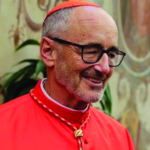 1. Cardinal Michael F. Czerny, S.J., 76, is a Czechoslovakian-born Canadian who has been prefect of the Dicastery for Promoting Integral Human Development since April 23, 2022, previously undersecretary of the dicastery since 2017. Pope Francis made him a cardinal in 2019.
1. Cardinal Michael F. Czerny, S.J., 76, is a Czechoslovakian-born Canadian who has been prefect of the Dicastery for Promoting Integral Human Development since April 23, 2022, previously undersecretary of the dicastery since 2017. Pope Francis made him a cardinal in 2019.
Czerny has worked to promote social justice in Canada, Latin America, Africa, and Rome, and was the special secretary for the Synod on the Amazon.
In a 2022 conference, “Doing Theology from the Existential Peripheries,” Cardinal Czerny said that the Church must learn from those on “the peripheries”: “The Church and contemporary world… are intertwined in people’s lives. They coexist in us. Doing theology from the existential peripheries is a way to glimpse God in this intertwining and to allow Him to speak to us.”
On fraternity, Cardinal Czerny said at an April 2022 event on international affairs that the full realization of man’s potential is at the center of the Church’s concerns, and noted that the Declaration of the Rights of Man and of the Citizen issued during the French Revolution, which also inspired the milestone Universal Declaration of Human Rights of 1948, is one of the “highest expressions of the recognition of human dignity” and a point of reference for Western modern democracies.
Cardinal Czerny also takes a hard line on climate change issues, endorsing calls for a “fossil fuel non-proliferation treaty,” and saying, “All new exploration and production of coal, oil, and gas must immediately end, and existing production of fossil fuels must be urgently phased out.”
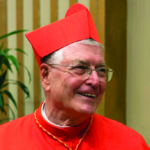 2. Cardinal Gianfranco Ghirlanda, S.J., 80, a renowned professor of theology, was made a cardinal by Pope Francis as Father Ghirlanda. He started off his career working a regular job at Fiat to pay for his studies at university, eventually ordained a Jesuit in 1973. He earned a doctorate in Canon Law summa cum laude in 1978, from the Pontifical Gregorian University, where he subsequently taught Canon Law, became dean and, later, rector until 2010.
2. Cardinal Gianfranco Ghirlanda, S.J., 80, a renowned professor of theology, was made a cardinal by Pope Francis as Father Ghirlanda. He started off his career working a regular job at Fiat to pay for his studies at university, eventually ordained a Jesuit in 1973. He earned a doctorate in Canon Law summa cum laude in 1978, from the Pontifical Gregorian University, where he subsequently taught Canon Law, became dean and, later, rector until 2010.
For the Holy See, he has served as a consultor on different congregations and councils. For example, he was a key author in the 2009 Anglicanorum coetibus, which created the Anglican Ordinariate for former Anglicans who wanted to join the Catholic Church but retain some of their liturgy. He also helped to reintegrate religious institutions like the troubled Legion of Christ in 2014.
Most recently, he authored the curial reform document Praedicate Evangelium, promulgated in March 2022, in which, for the first time, it was stated that the juridical authority to lead a Vatican dicastery was now open to lay men and women.
Cardinal Ghirlanda told the press: “The vicarious authority to carry out an office is the same if received by a bishop, a presbyter, a consecrated man or woman, or a lay man or woman.” Others, like Cardinal Marc Oullet, prefect for the Dicastery for Bishops, disagreed, saying that although the “juridical” and “sacramental” functions of the bishop are not identical in concept, they necessarily coincide in fact.
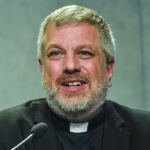 3. Fr. Giacomo Costa, S.J., 55, Communications Secretary for the 2019 Synod on the Amazon and contributor to its final document, was appointed by Pope Francis as a consultor to the General Synod on Synodality, making him effectively one of Archbishop Hollerich’s closest collaborators.
3. Fr. Giacomo Costa, S.J., 55, Communications Secretary for the 2019 Synod on the Amazon and contributor to its final document, was appointed by Pope Francis as a consultor to the General Synod on Synodality, making him effectively one of Archbishop Hollerich’s closest collaborators.
In a report on the Synod on Synodality’s Working Document for the Continental Stage (“DCS”) of the synodal process, entitled “Enlarge the Space of Your Tent,” Fr. Costa highlighted facets of the report which he called “hinges” of the structure of the “tent” of the Church: one of them was “radical inclusion — no one is excluded!” on which he further elaborated: “This urge to inclusion translates Isaiah’s invitation to ‘enlarge the tent’ and is directed toward a wide range of people and groups who for the most diverse reasons live in a condition that the DCS describes through the biblical category of exile, ‘an exile, the consequences of which affect the entire People of God: if the Church is not synodal, no one can really feel fully at home’ (No. 24).
“There is room here for attention to ‘women and young people who do not feel their gifts and abilities are recognized’ (No. 38), to ‘many members of the clergy who do not feel listened to, supported and appreciated’ (No. 34), as well as to ‘those who for various reasons feel a tension between belonging to the Church and their own affective relationships, such as, for example: remarried divorcees, single parents, people living in a polygamous marriage, and LGBTQ people’ (No. 39).”
He also stressed the document’s calls to eradicate clericalism and stressed the ministry of the laity and the inclusion of women in the governance of the Church: “For example, the DCS points out ‘the importance of ridding the Church of clericalism, so that all its members, both priests and laity, can fulfill the common mission’ (No. 58). In this light, there is also the question of lay ministries and especially the place of women within the Church, also with respect to participation in decision-making processes and access to the structures of governance: ‘From all continents comes an appeal for Catholic women to be valued first of all as baptized and equal members of the People of God’ (No. 61).”
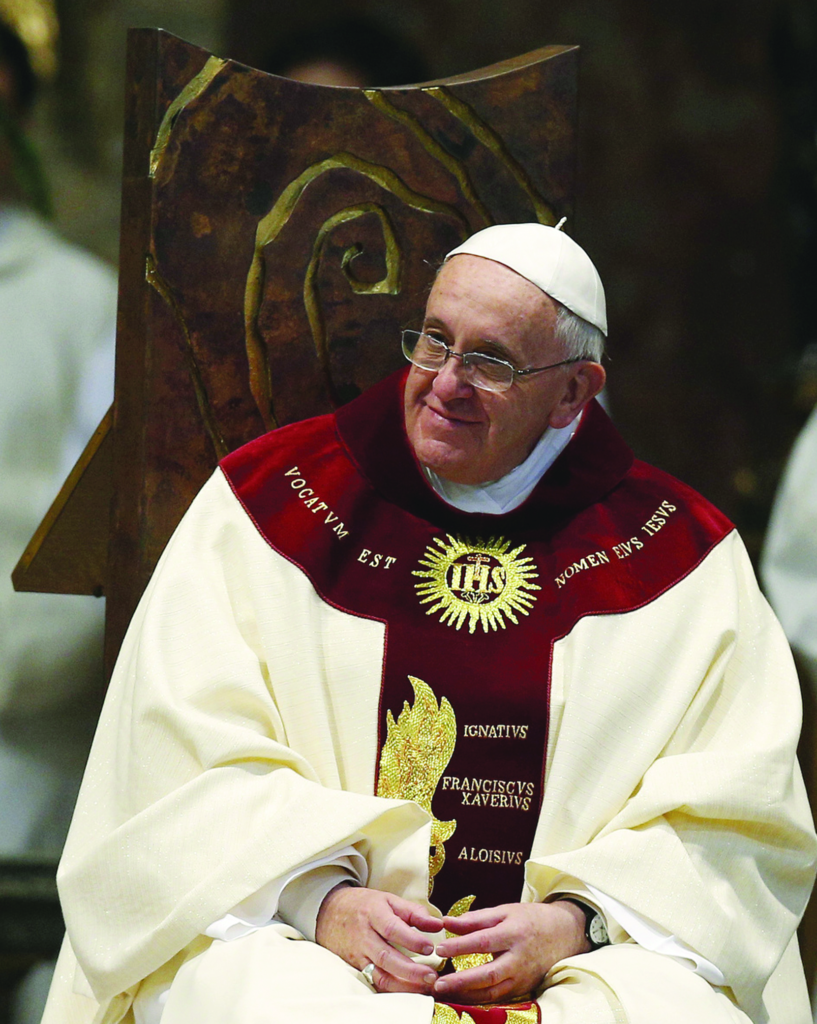
Pope Francis smiles during Mass at the Church of the Gesù in Rome on January 3, 2014. The Mass was celebrated on the feast of the Most Holy Name of Jesus in thanksgiving for the recent canonization of Jesuit St. Peter Faber
Last year, Fr. Costa caused indignation by saying Italian anti-homophobia legislation (called the “ddl Zan” bill) “was needed,” as the “priority is the defense of the person against all violence and against all discrimination.” Italian bishops, and the Vatican, opposed the bill, which was ultimately defeated.
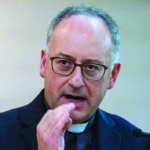 4. Fr. Antonio Spadaro, S.J., 55, editor-in-chief of the Jesuit publication La Civiltà Cattolica, has been reported to have the Pope’s ear at all times. Shortly after his election as Pope, Francis called Fr. Spadaro to give him an extensive interview; he has been a frequent visitor at the Pope’s apartments ever since. Fr. Spadaro is also the author, along with Presbyterian Rev. Marcelo Figueroa, editor-in-chief of the Argentinian edition of L’Osservatore Romano, of a very controversial 2017 essay in his magazine, entitled “The Ecumenism of Hate,” in which they condemned “fundamentalist” Christians as being the root of “conservative” Catholic attitudes they find odious.
4. Fr. Antonio Spadaro, S.J., 55, editor-in-chief of the Jesuit publication La Civiltà Cattolica, has been reported to have the Pope’s ear at all times. Shortly after his election as Pope, Francis called Fr. Spadaro to give him an extensive interview; he has been a frequent visitor at the Pope’s apartments ever since. Fr. Spadaro is also the author, along with Presbyterian Rev. Marcelo Figueroa, editor-in-chief of the Argentinian edition of L’Osservatore Romano, of a very controversial 2017 essay in his magazine, entitled “The Ecumenism of Hate,” in which they condemned “fundamentalist” Christians as being the root of “conservative” Catholic attitudes they find odious.
Phil Lawler, editor of Catholic World News, put it this way: “The authors of the essay claim to embrace ecumenism, but they have nothing but disdain for the coalition formed by Catholics and Evangelical Protestants in the United States. They scold American conservatives for seeing world events as a struggle of good against evil, yet they clearly convey the impression that they see American conservatism as an evil influence that must be defeated.
“While they are quick to pronounce judgment on American politicians, the two authors betray an appalling ignorance of the American scene… The essay is written from the perspective of people who draw their information about America from left-wing journals rather than from practical experience.”
Fr. Spadaro was quick to label those who expressed opposition to the thesis of his essay as “haters” on social media. Undaunted by the torrent of criticism his “Ecumenism of Hate” essay provoked, in 2020 he recommended that, amid rising tensions in the Middle East, people should read it again.
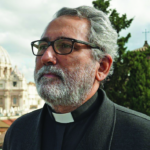 5. Fr. Juan Antonio Guerrero Alves, S.J., 63, is a Spanish Jesuit who was appointed prefect of the Vatican Secretariat for the Economy as of January 1, 2020. Before that he taught at the university level and held administrative positions within the Jesuit Order. [Note: On November 30, Pope Francis named a layman, Spanish economist Maximino Caballero Ledo, 63, who has a wife and two children, to succeed Guerrero Alves.]
5. Fr. Juan Antonio Guerrero Alves, S.J., 63, is a Spanish Jesuit who was appointed prefect of the Vatican Secretariat for the Economy as of January 1, 2020. Before that he taught at the university level and held administrative positions within the Jesuit Order. [Note: On November 30, Pope Francis named a layman, Spanish economist Maximino Caballero Ledo, 63, who has a wife and two children, to succeed Guerrero Alves.]
In recent years the Holy See’s finances have been marked by a lack of transparency exemplified by a failed real estate deal in London that landed disgraced Cardinal Angelo Becciù and others in a Vatican City courtroom in 2021 on charges of financial malfeasance (the trial continues). Fr. Guerrero Alves said in a 2022 interview with Vatican News, “We are well aware that we have made major mistakes in financial management, which have undermined the credibility of the Holy See. We seek to learn from them and we believe we have remedied them so that they do not happen again. In recent years, encouraged by the Holy Father, we have taken important steps in the right direction in economic management: greater professionalization, more teamwork, more transparency and less secrecy. We are working in the right direction.”
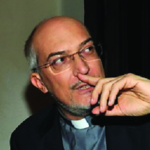 6. Fr. Francesco Occhetta, S.J., 52, General Secretary of the Fratelli Tutti Foundation, is also the “number two” under Cardinal Mauro Gambetti, Archpriest of St. Peter’s Basilica. Until 2020, Fr. Occhetta was political columnist for the Jesuit journal La Civiltà Cattolica.
6. Fr. Francesco Occhetta, S.J., 52, General Secretary of the Fratelli Tutti Foundation, is also the “number two” under Cardinal Mauro Gambetti, Archpriest of St. Peter’s Basilica. Until 2020, Fr. Occhetta was political columnist for the Jesuit journal La Civiltà Cattolica.
In that capacity, Fr. Occhetta wrote several articles, including a 2017 essay condemning “populism.” In it, he said, “To hold back populist movements it is necessary to have processes of greater democratization; to battle against social inequality through the redistribution of income and power; to rethink the forms of political parties, and more generally, democratic participation at all levels, to transform it into a culture.”
Speaking of contemporary European populist movements, he went on: “The blend of populism and nationalism is made possible by a weak European Union and a fragile Eurozone. The choice by France, Germany, and some northern European countries to prevent the intergovernmental institutions and the European Council from making political decisions has opened up a flank for populisms.
“The idea of the European Union as a synthesis of the policies of national governments and European policy has not worked… Greater competences and political powers — in economic and monetary matters, as well as common defense policy and foreign policy — should be transferred from single states to the European federal political bodies, the European Parliament, and the European Council.”
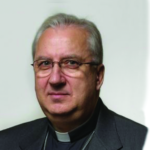 7. Bishop Daniele Libanori, 69, was raised to the episcopate by Pope Francis in 2018 and made Auxiliary Bishop of Rome, under Pope Francis himself as Bishop of Rome. During the COVID closures of the churches in Rome in 2020, Bishop Libanori was active in assuring his Roman flock that a “mature” faith could and should be nourished in the absence of the Eucharistic sacrament. An essay he wrote for the Jesuit publication La Civiltà Cattolica said:
7. Bishop Daniele Libanori, 69, was raised to the episcopate by Pope Francis in 2018 and made Auxiliary Bishop of Rome, under Pope Francis himself as Bishop of Rome. During the COVID closures of the churches in Rome in 2020, Bishop Libanori was active in assuring his Roman flock that a “mature” faith could and should be nourished in the absence of the Eucharistic sacrament. An essay he wrote for the Jesuit publication La Civiltà Cattolica said:
“It must be recognized that it is not up to the Church, but to the state, to legislate on public health. Faced with a problem the gravity of which not everyone is yet fully convinced, this — and this alone — is the level on which decisions must be taken regarding access to places of worship, without recalling principles that are so ideological. In a time of emergency like the present, faith and devotion must find new ways. […]
“Here it is necessary to ask ourselves honestly and with much respect a question of no small importance for us pastors: is the protest against the closure of churches animated by faith or rather by a religiosity yet to be purified?… In the too insistent request for the Eucharist there is often a sincere faith… but it is not a mature one…”
In December 2018, the Priestly Fraternity of Familia Christi, whose priests say the Traditional Latin Mass, received official notice from the Vatican’s Congregation for the Doctrine of the Faith that its Superior General Don Riccardo Petroni, was to step down and would be replaced by Bishop Libanori — originally from Ferrara — who was named “plenipotentiary commissioner and delegate of the Holy See for the Priestly Fraternity of Familia Christi.” No specific complaints from the faithful who belonged to Familia Christi had ever been cited; however, the supportive bishop of Ferrara, Archbishop Luigi Negri, had been replaced by the more “progressive” Bishop Gianfranco Perrego, who was not a friend of the Traditional Mass.
Libanori was to assume the governance of the Priestly Fraternity of Familia Christi, and to determine, in collaboration with the pontifical commission Ecclesia Dei, possible future paths for the Familia Christi. Unfortunately, a little over a year later, in February 2020, the Archdiocese of Ferrara announced that the Fraternity’s activities were being suspended — in effect dissolving it — and its seminarians asked to leave. Antipathy to “traditionalism” was widely cited as the reason by its members, especially in the absence of any specific evidence of malfeasance or even mismanagement.
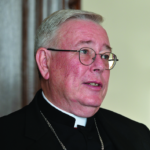 8. Cardinal Jean-Claude Hollerich, S.J., 64, the first cardinal from Luxembourg, has served as the Archbishop of Luxembourg since 2011, and president of the Commission of the Bishops’ Conferences of the European Union (COMECE) since 2018.
8. Cardinal Jean-Claude Hollerich, S.J., 64, the first cardinal from Luxembourg, has served as the Archbishop of Luxembourg since 2011, and president of the Commission of the Bishops’ Conferences of the European Union (COMECE) since 2018.
In addition to studies and pastoral work in Belgium, Germany, and Luxembourg, he studied in Japan from 1985 to 1989 and worked there from 1994 to 2011, for 17 years.
Cardinal Hollerich gave a lengthy October 2022 interview to the Vatican newspaper L’Osservatore Romano, in which he discussed his view of the mission of the Church, characterizing it as “to proclaim the Gospel… a testimony that the Christian must interpret mainly through his commitment in the world for the protection of creation, for justice, for peace.” On the priesthood, the cardinal opposes the traditional idea that there is an ontological character to the ordained priesthood that is not present in the laity: “Indeed, all of us priests must understand that there is no ministerial priesthood without a universal priesthood of Christians, because it originates from this. I am well aware that the difficulty of assimilating a concept, fundamentally so elementary, is opposed by a presbyterial formation that still lingers on an ‘ontological diversity’ that does not exist.”
Most notably, Cardinal Hollerich has been outspoken on several occasions in his belief that modern man is undergoing an “anthropological transformation” that requires the Church to change her attitudes about many things: “Today we are not even able to imagine it, but there will be very, very big anthropological transformations. In the awareness that man can only partially influence his own evolution…I don’t want to sound trenchant but, very frankly, our pastoral care speaks to a man who no longer exists.”
An example of this “anthropological transformation,” maintains the cardinal, can be seen in the area of homosexuality: “Pope Francis often recalls the need for theology to know how to originate and develop starting from human experience, and not remain the result of academic elaboration alone.
“So many of our brothers and sisters tell us that, whatever the origin and cause of their sexual orientation, they certainly didn’t choose it. They are not ‘bad apples.’ They are also the fruit of creation. And in Bereshit [Genesis] we read that at each step of creation God is pleased with his work saying ‘and he saw that it was good.’”
While reaffirming that “there is no room for sacramental marriage between people of the same sex, because there is no procreative purpose that characterizes it,” he nevertheless proclaims, in seeming contradiction to the Catechism’s teaching that homosexuality is “intrinsically disordered,” that “this does not mean that their affective relationship has no value.”
Cardinal Hollerich has been given the most powerful position in the Pope’s project to move the Catholic Church more toward a permanent “synodality.”
Cardinal Hollerich was Francis’ choice to be the “Relator General” of the Synod on Synodality which is engaging the attention of the entire Church over a three-year period, ending in 2024.
Some believe Hollerich is a possible successor to the papacy, and is favored by Pope Francis himself.
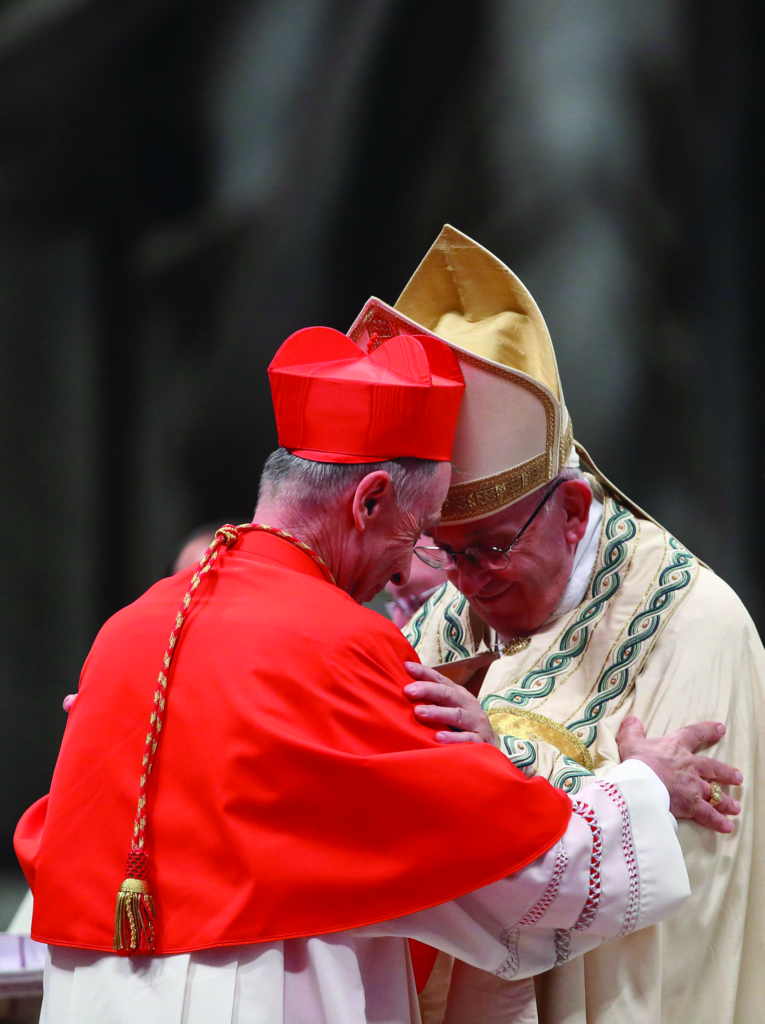
On June 28, 2018, in St. Peter’s Basilica, Pope Francis celebrated an Ordinary Public Consistory for the creation of new cardinals. Here he embraces Cardinal Luis Ladaria Ferrer, prefect of the Congregation for the Doctrine of the Faith
9. Pope Francis, 85, is the ninth Jesuit in Rome in a high position in the Catholic Church. Francis was, at least partly, theologically formed in the South American religious climate of the 1970s, which saw a dramatic shift toward “this-worldly” peace-and-justice activism, even the attempt to “baptize” Marxism (in the guise of “liberation theology”), especially in the Jesuit Order. The themes of the Francis pontificate are markedly more emphatic about serving the poor, saving the environment from pollution and climate change, combatting “populism,” “accompanying” those in non-traditional lifestyles, and curbing liturgical traditionalism than any of his predecessors. So it is not surprising that he is considered by many the most “progressive” Pope to date, coming from a “progressive” religious order — the Society of Jesus.
10. Special mention must be made of another Jesuit in the Curia, but this Spanish professor of moral theology is perhaps not cut from the same ideological cloth as the others: Cardinal Luis Ladaria Ferrer, 78, a Spanish moral theologian, was elevated to the episcopate by Pope Benedict XVI in 2008 and made a secretary for the Congregation for the Doctrine of the Faith. On July 1, 2017, Pope Francis appointed Ladaria prefect of the CDF, succeeding Cardinal Gerhard Ludwig Müller. Ladaria also succeeded to the offices held ex officio by the prefect: president of the Pontifical Commission Ecclesia Dei (suppressed January 2019), president of the Pontifical Biblical Commission, and president of the International Theological Commission.
In June 2018, Pope Francis made Ladaria a cardinal. In an essay printed in L’Osservatore Romano on May 29, 2018, Ladaria wrote that those who raise the possibility of female priests “create serious confusion among the faithful.”
In a 2021 letter to the head of the USCCB on the question of Holy Communion for pro-abortion politicians, Cardinal Ladaria said, “The bishops should affirm… that ‘those who are directly involved in lawmaking bodies have a grave and clear obligation to oppose any law that attacks human life.’”





Facebook Comments